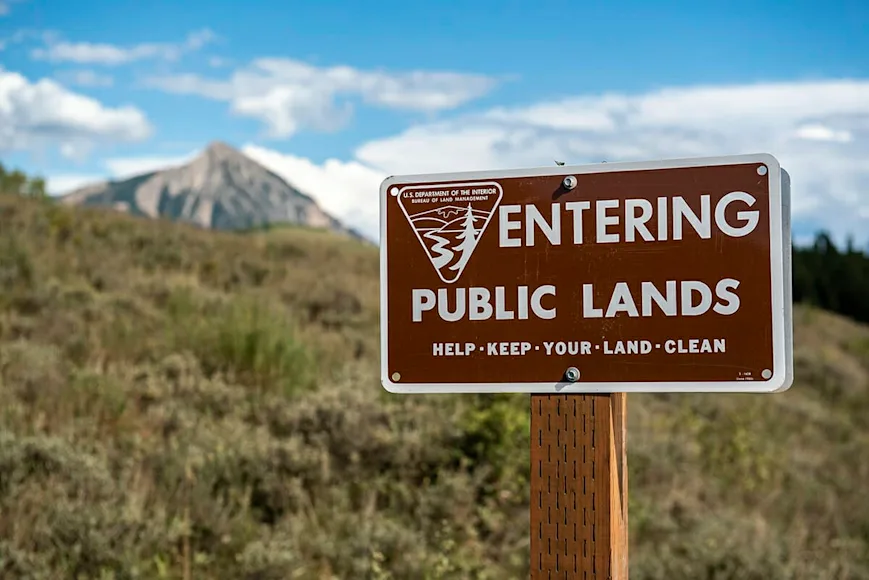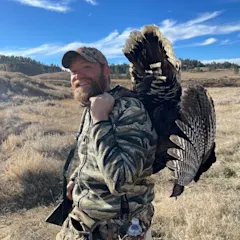Hunting and fishing conservation groups are raising red flags after lawmakers in the U.S. House and Senate floated plans to sell off federally managed public lands in order to meet budgetary goals. The news broke Wednesday morning after certain Republican lawmakers told E&E News POLITICO they were open to selling public lands, with one suggesting the sale of lands bordering National Parks and Western cities.
“There’s credible evidence that lawmakers are looking at public land sales as a way to generate revenue through reconciliation,” Joel Webster, Chief Conservation Officer for the Theodore Roosevelt Conservation Partnership, tells Field & Stream. “Public lands are critical to millions of Americans for hunting and fishing access. If we lose them, a lot of people are going to lose opportunities to spend time outdoors. It’s unacceptable.”
Budget reconciliation is a special legislative process that allows the Senate to pass budget directives with a simple majority of 51 votes, instead of the usual 60—and to bypass a potential filibuster. Webster says it's a bad way to address the potential transfer or sale of public land parcels, which is typically handled by individual land-management agencies. Those agencies, he says, must follow specific criteria and guardrails designed to serve the public interest.
“With some sort of a directive to sell public lands, there’s a real risk that lands could be sold in places where people are not asking for this, in and around areas where people really value their public lands for hunting and fishing access,” says Webster. “TRCP urges Congress not to include any sort of public land sales in reconciliation legislation.”
Speaking with POLITICO, Republican Congressman Bruce Westerman of Arkansas' 4th District alluded to the sale of public lands that border National Parks. “It would just be in areas where you can’t get affordable housing, like for gateway communities,” said Westerman, who chairs the House Natural Resources Committee, “so you could actually have people to work in the national parks, maybe around some big metropolitan areas in the West.” Webster says those remarks are a sign that the lawmakers might be considering land sales beyond just those managed by Bureau of Land Management (BLM). "Often those are Forest Service lands that border National Parks," he notes. "It’s very unclear what would be at risk. But because of the way reconciliation bills are written, it is very hard for Congress to do this strategically. And there would be a lot of discretion left to the [Trump] Administration."
Republican lawmakers in Montana—where public land sales and transfers of federal lands to the state have been a hot-button issue for years—have expressed opposition to the idea of selling off public lands. “Senator Daines has never and will never support the sale of public lands,” an aide said in a text message sent to POLITICO. Montana Republican Ryan Zinke, who represents the Big Sky State's first congressional district, expressed similar sentiments, telling the outlet that the sale of public lands is a red line for him. “I have made clear: There are some things I won’t do,” he said. “I will never bend on the Constitution, and I won’t bend on selling our public lands.”
Webster says he hopes more Republican lawmakers will speak out against the idea in the coming days, as the reconciliation process moves forward. "Congressman Zinke and Senator Daines have both been great on keeping public lands in public hands and we appreciate that," he says, "and we hope additional lawmakers will join them in making it clear that this isn’t a good idea."
In a statement shared with Field & Stream, Montana Sen. Tim Sheehey's staff expressed his general reservations about selling off federally managed public lands. "Senator Sheehy does not support the sale of public lands," Sheehey's Communications Director Tate Fletcher said in the emailed statement. Public lands were a flashpoint during Sheehey's recent race for the Montana Senate, with his Democratic opponent Jon Tester claiming he had a history of supporting federal land transfers—though Sheehy pushed back on the allegations.
Other hunting- and fishing-focused conservation groups sounding alarm bells about the potential inclusion of public land sell offs in the budget reconciliation process include Backcountry Hunters & Anglers and Trout Unlimited. "It’s important to remember that Utah Senator Mike Lee is the Chair of Senate Natural Resources Committee, which has the authority over this process," said BHA Director of Policy and Government Relations Kaden McArthur. "It’s no surprise to anyone how Sen. Lee feels about public land sales."
As McArthur alludes to, Mike Lee has been a longtime supporter of transferring federal lands to states or even selling them outright. His HOUSES Act, which failed the Senate in 2022, sought to sell off public lands for housing, and he’s been a vocal proponent of Utah’s legal bid to dispose of some 18.5 million acres of Bureau of Land Management lands. In a recent post to X, Lee said: “U.S. government = earth’s worst land manager.”
The proposal to sell public lands as part of a reconciliation package comes amid major shake-ups at the US Forest Service, the National Park Service, US Fish & Wildlife, and the Bureau of Land Management. On Valentines Day, Elon Musks’ DOGE fired thousands of critical employees across all of the public land agencies. A few weeks later, Secretary of Interior Doug Burgum announced a task force/partnership with the Department of Housing and Urban Development (HUD) that aims to turn an untold amount of federal land into housing developments. Trump Administration officials claim the move would quell the nation’s prolonged housing crisis, but public land advocates remain skeptical.
Read Next: Feds Extend Comment Period for Lithium Mine Proposal in Prime Public Land Mule Deer Unit
Joel Webster says the best thing that concerned hunters and anglers can do right now is contact their two Senators and the House member that represents their congressional district. "There’s been a lot of pent up energy around this issue. Hunters are feeling uneasy about these big talks about public land transfer or land sale and the potential of it," he said. "For folks who are fired up about this issue and anxious about it: Here is your opportunity to make sure it doesn’t happen."


